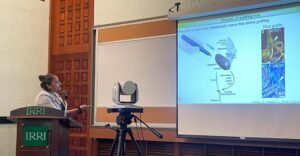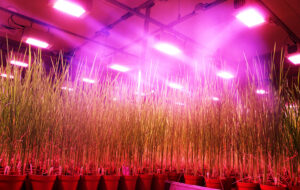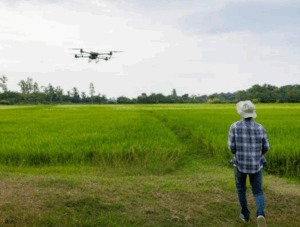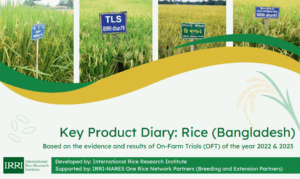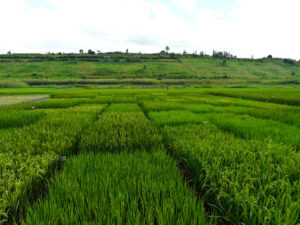I thought, “Oh dear, we’ve got a problem here.” It was so funny to see these wonderful eco-friendly people there for the opening of the doomsday vault facing the reality of what a traditional Arctic dinner was. It was funny for me because so many of us—myself included—project our own fantasies on what we would like to think is the perfect world. We like to think of traditional people living in harmony; we like to think of small farmers having wonderful lives in the countryside with multiple cropping systems, etc. We project our fantasies on people and then we work, I think sometimes, to try to make their lives be like our fantasies. And that’s a very self-centered and selfish thing. I think that we often do a disservice to them an
d to ourselves. As people who are involved in so-called development, we need to make sure that we don’t project our desires onto someone else and to try change their lives to what we would like ours to be as success or as impact.
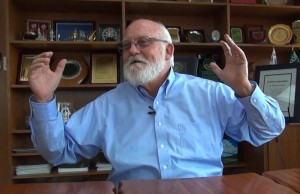
The vegetarians at Svalbard were really hungry. I got a complete belly laugh when the next morning, at the hotel, we had a buffet for breakfast. It was the leftovers from the dinner the night before—they probably just put it outside, because it is cold out there. I was going through the line and I turned to the woman next to me who was looking thinner and thinner. She had this little plate, I think she had some granola on it, and there was this big pile of whale meat in front of her. And I turned to her and I said, “You know this is just one of life’s great quandaries”, and she asked, “What’s that?” I said, “What do you do with leftover whale?” The entire line of people burst out laughing; some had a sense of humor. But, there were people who were very hungry at the end of that trip—no salads, no veggies, no tofu.
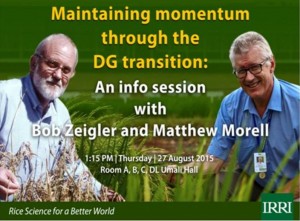
Matthew Morell—ideally suited to be the next IRRI DG
I am extremely happy that Matthew Morell has been selected [as the next DG of IRRI]. He will have his work cut out for him and he’ll do things differently than I have. But Matthew, like so many people who come to work for IRRI, get bitten by the bug and get consumed by the passion of this Institute. It’s an Institute unlike any other. You don’t just work for IRRI; you become a part of IRRI and IRRI becomes a part of you. Matthew is becoming that kind of IRRI person and I think he is ideally suited to be the next director general. Like all of us, he’ll have his ups and downs; he’ll make mistakes. But I’m confident that Matthew will continue to maintain the Institute’s focus.
The core of the Institute will continue to be genetic resources (that’s just the nature of the beast). But Matthew and our colleagues understand the complementarity and critical nature of crop management, crop protection, social sciences, and socioeconomic dimensions—all of which enable the Institute’s impact to continue.
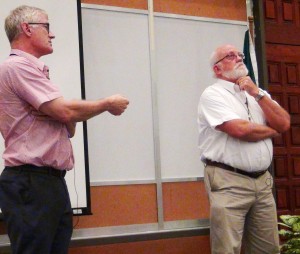
Advice for Matthew
I was asked to give Matthew advice [photo at left during our joint Zeigler-Morell seminar, 27 August 2015]. I think the thing that worked the best for me is to have self-confidence. You’ve gone through a career, gained experience; you’ve been to many places; you’ve seen many things; you are the person who is ultimately responsible for what happens at IRRI. [Former U.S. President] Harry S. Truman [photo below] said, “The buck stops here.” It has become a platitude, but the fact is, you can’t blame anybody else when something goes wrong. If things go right, other people get the credit.

Get as much advice as you can from people you respect. But when you make a decision, you have to be comfortable with it. Follow your judgment; never, ever make a decision that you fundamentally think is wrong, but other people pressure you to go that way. You’re selected for the position for a reason. Your people have confidence in you. You just have to follow your gut.
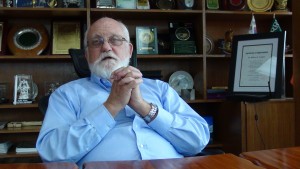
IRRI’s big challenge
The big challenge will be how we relate to the private sector. There’s no question that the private sector is increasingly interested in rice and it’s going to be our challenge to maintain our public institution persona while taking advantage of the situation. I think it’s our job to co-opt and help direct the way the private sector moves in a way that the maximum number of people benefits—the small farmer, medium-sized farmer, poor middle-class consumers—all of them will benefit from IRRI’s work. We have the ability to manipulate how the private sector interacts. We have the ability to help countries come up with policies that maximize the impact of our work. That’s the challenge of the Institute.
I’m quite optimistic that the Institute will continue to be relevant and when I take my last breath—whenever that is—IRRI will still be a strong and relevant institution. These are exciting times to be a part of IRRI, be a part of rice research; no doubts in my mind about that. I’ve been UNBELIEVABLY fortunate to have been a part of IRRI for almost 18 years. For seven of them, I had a real job as a scientist. And over 10 years as director general, I consider that a blessing. How I came to achieve it or deserve it, I’m not going to ask any questions, but I’m deeply grateful for the opportunity.
Challenges in plant pathology
In terms of the future in plant pathology, I expect that, over the next decade or so, we are going to have a profound understanding of how plant pathogens interact with the host plant. Based on that understanding, we will be able to very effectively manage plant diseases to the point where they are irrelevant in terms of production losses. I don’t want to sound like we have the secrets of all technologies and that we can solve every problem, but we basically completely understand how the bacterial pathogens interact with plants and we can manage them accordingly.
Although the fungi and nematodes are far more complex, I think the basis of pathogenesis and susceptibility will be worked out to the extent that we will be able to basically have any disease epidemic of any consequence be merely historical records. I think that we should be able to manage them. It’s going to take a decade or two, but these are very exciting times that involve the information that we accumulate, the genomes, the understanding of more subtle ways in which epigenetics control gene expression, and the very subtle interactions with the environment. I don’t want to sound like I’m a complete naive technophile, but the handwriting is on the wall. We will be able to manage many of these situations in a way that was only a dream 5 or 10 years ago.
10 Next

